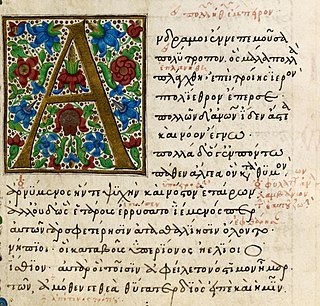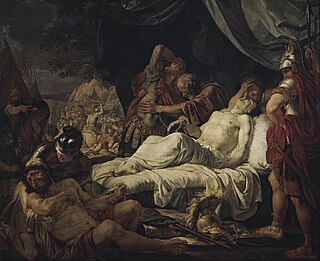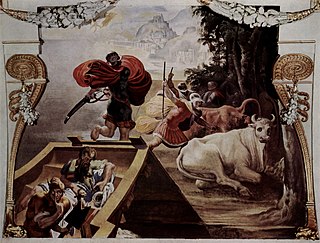Eurylochus may refer to:
- Mythological characters
- Eurylochus (mythology), second-in-command of Odysseus' ship in Homer's Odyssey
- Eurylochus, one of the sons of Aegyptus and Caliadne. He married (and was murdered by) Autonoe, daughter of Danaus and Polyxo
- Eurylochus from Zacynthos, one of the suitors of Penelope. He spoke out against Odysseus in the Odyssey
- Eurylochus, dragon-slayer of the mythological dragon Cychreides on the isle of Salamis
Cychreides is a fabled dragon, or serpent, from Greek mythology. It is named after Cychreus, the Greek demigod who either raised or killed it, depending on the version of the story being told.
- Historical characters
- Eurylochus (Thessalian general) (6th century BC), Thessalian general from the Aleuadae family who fought in the First Sacred War
- Eurylochus (Spartan general) (died 426 BC), Spartan general during the Peloponnesian War, was killed at the Battle of Olpae
- Eurylochus (4th century BC), a student of Pyrrho along with Hecataeus of Abdera and others (the 'Pyrrhoneans')
The First Sacred War or Cirraean war, was fought between the Amphictyonic League of Delphi and the city of Kirrha. In the beginning of the 6th century B.C. the attempt of the Pylaeo-Delphic Amphictyony, controlled by the Thessalians, to take hold of the Sacred Land of Apollo ended up in this war. Its end was marked by the organization of the first Pythian Games. The conflict arose due to Kirrha's frequent robbery and mistreatment of pilgrims going to Delphi and their encroachments upon Delphic land. The war resulted in the defeat and destruction of Kirrha. The war is notable for the use of chemical warfare at the Siege of Kirrha, in the form of hellebore being used to poison the city's water supply.
The Battle of Olpae was a battle of the Peloponnesian War in 426 BC, between armies led by Athens and Sparta.
Hecataeus of Abdera or of Teos, was a Greek historian and sceptic philosopher who flourished in the 4th century BC.
Caliadne or Caliadna, in Greek mythology, was a naiad of the river Nile, presumably one of the daughters of the river-god Nilus. She was one of the wives of Aegyptus, bearing him twelve sons: Eurylochus, Phantes, Peristhenes, Hermus, Dryas, Potamon, Cisseus, Lixus, Imbrus, Bromios, Polyctor, and Chthonios. These sons married the daughters of her sister Polyxo, and were murdered by them.

In Homer's Odyssey, Penelope is the wife of Odysseus, who is known for her fidelity to Odysseus while he was absent, despite having many suitors. Her name has therefore been traditionally associated with marital fidelity.
| This disambiguation page lists articles about people with the same name. If an internal link led you here, you may wish to change the link to point directly to the intended article. |











